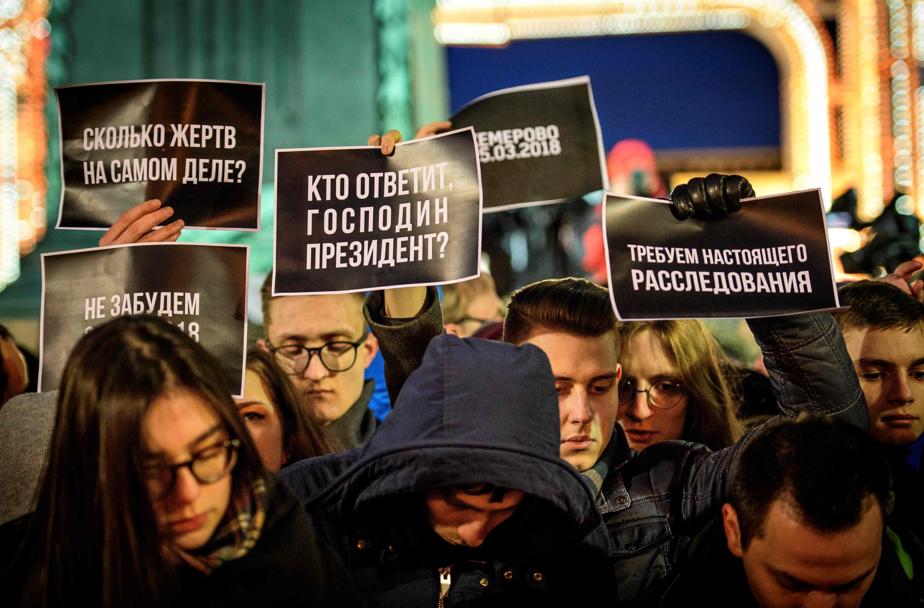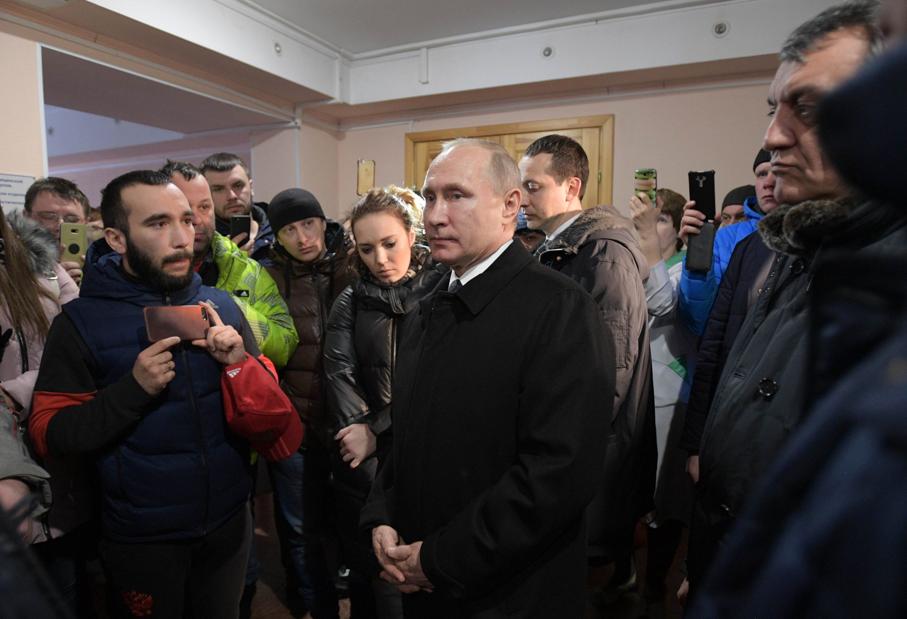

MOSCOW — At the end of a month that has seen him unveil new “invincible’’ missiles, announce a space mission to Mars, and secure a sky-high vote in Russia’s presidential election, Vladimir Putin faced a grim reality on the ground Tuesday: a nation enraged by the death of dozens of children trapped in a burning mall.
Putin traveled to Siberia to lay flowers next to a makeshift memorial for at least 64 people, many of them children, who burned to death Sunday in the mall. Some of the children died as they banged on locked exit doors and screamed for help from their parents over cellphones.
“How could this ever happen?’’ Putin asked local officials, echoing a question now being asked across Russia by a population that just recently voted overwhelming to reelect a president who, during his previous 18 years in power, repeatedly boasted of making Russia strong and safe.
Public anger at the horrendous fire — and claims that official bungling and corruption played a part — drowned out official fury over Monday’s expulsion of Russian diplomats by 23 countries. Even on state-controlled television, news about the fire pushed aside routine denunciations of the West as the agent of Russia’s ills just as four more countries ordered out diplomats over a nerve-agent attack that London has blamed on Moscow.
Horrific accounts of children struggling to escape the blazing shopping mall, however, distracted public attention from a diplomatic crisis that would normally have been seized on by the Kremlin to stoke patriotic fervor and promote its view of Russia as a besieged fortress whose problems are mostly because of “Russophobic’’ foreigners.
Russia-24, an around-the-clock state news channel, tried early Monday to stick to its usual fare of patriotic programming, broadcasting a panel “discussion’’ featuring fiery tirades against the West. But even that exercise had to pause to give the announcer time to express condolences over the deaths in Siberia.
By afternoon, however, the coverage was focused almost entirely on the shopping mall tragedy and a tightly choreographed visit by Putin to the grief-stricken town of Kemerovo, more than 2,000 miles east of Moscow.
Putin’s comforting words in Siberia, where he harangued officials and visited the memorial, had to compete with a rival narrative of official bungling and corruption spread on social media and on the website of Alexei Navlny, the anticorruption campaigner who was barred from running in the March 18 election against Putin.
Eager to keep control of the story, Putin warned people to stick to official information. “You know it very well that social media is a murky source unfortunately,’’ he told officials and relatives in Kemerovo. “We need to rely on the results of the actual inquiry.’’
That Russia is far being a monolithic one-party state, despite Putin’s lopsided reelection, was clear from the organization in Moscow on Tuesday of two separate events to mourn the dead in Kemerovo.
One was state-sponsored, near the Kremlin; the other was held in Pushkin Square, by Muscovites who wanted no part in the official gathering. The alternative wake began as a solemn vigil with mourners burning candles and laying flowers, some of them in tears, but gradually turned into a small-scale political rally with chants of “Russian without Putin,’’ “Corruption kills!’’ “Shame on television!’’ and “Silence means death.’’
Instead of fuming at the United States and its allies, Putin drew from another tool in his repertoire of responses to most problems: He set the security apparatus to work, telling relatives of the victims that the Investigative Committee, Russia’s answer to the FBI, had deployed 100 investigators and would find those responsible for the fire and punish them.
He blamed “criminal negligence’’ and “slovenliness’’ for the blaze, which started in a children’s play area and then swept through nearby cinemas crowded with young people.
The regional governor, Aman Tuleyev, a relic of the Soviet era, begged for forgiveness and accused opposition activists of trying to exploit the tragedy for political ends. “It’s sacrilege when there’s grief and you use it to solve your own problems,’’ the governor said.
But Putin avoided mention of what many, including those who lost family members, believe was the real cause of the fire: a state system, including multiple agencies responsible for controlling fires and other risks, eaten away by corruption and incompetence.
Igor Vostrikov, who lost his wife, three children, and a sister in the fire, summed up this view with an enraged message on social media. “I no longer have a family,’’ Vostrikov wrote. “The ruling regime is guilty. Every bureaucrat dreams of stealing like Putin. Every state functionary treats people like garbage.’’
Government investigators, added Vostrikov, “will find a scapegoat, and the issue will be done with, but the threats — incompetence, widespread corruption, alcoholism, and total degradation of society — will go nowhere.’’
Just a few yards from the regional government offices were Putin met local officials, thousands of people gathered in Kemerovo’s central square, calling on the governor to resign and pouring scorn on those who repeated an official death toll that many believe undercounted the real number of victims.
Putin and the governor, Tuleyev, stayed away from the square. The governor’s deputy, Sergei Tsivilev, did visit and, according to the news website Znak, was met with cries of “The truth!’’ “Resign!’’ and demands that Putin come and address the throng.
Despite draconian fire regulations and an army of inspectors to enforce them, Russia has one of the world’s worst fire safety records. Between 2001 and 2015, according to a study by International Association of Fire and Rescue Services, Russia had an average of 7.5 deaths per 100,000 people from fires, compared with 1 in the United States, 2.7 in Kazakhstan, and 0.5 in France and Germany. Russia, where fire inspectors are notorious for extorting bribes, had the worst death rate of 41 countries covered by the study.
► More nations expel Russian diplomats. A6



